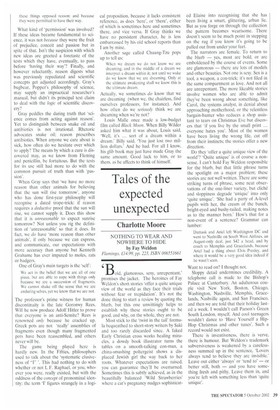Tales of the expected unexpected
Charlotte Moore
NOTHING TO WEAR AND NOWHERE TO HIDE by Fay Weldon Flamingo, £14.99, pp. 223, ISBN 006551661 Bold, glamorous, sexy, unrepentant,' promises the jacket. The heroines of Fay Weldon's short stories 'offer a quite unique view of the world as they face their trials without fear or trepidation'. It's not the done thing to start a review by quoting the blurb, but this one unwittingly helps to establish why these stories ought to be good, and why, on the whole, they are not.
Most stick to the 'twist in the tail' formula bequeathed to short-story writers by Saki and too rarely discarded since. A faked Early Christian cross works healing miracles, a dowdy book illustrator turns the tables on a smooth-talking con-man, a china-smashing poltergeist shows a displaced Jewish girl the way back to her roots. Whatever expectations are raised, you can guarantee they'll be overturned. Sometimes this is subtly achieved, as in the beautifully balanced 'Wild Strawberries' where a cat's pregnancy nudges sophisticat ed Elaine into recognising that she has been living a smart, glittering, urban lie. But as you forge on through the collection the pattern becomes wearisome. There doesn't seem to be much point in stepping on the rug if you know it's going to be pulled out from under your feet.
The narrators are female, To return to the blurb — yes, most are bold, or are emboldened by the course of events. Some are glamorous — there are lots of models and other beauties. Not one is sexy. Sex is a tool, a weapon, a con-trick; it's not filed in the same compartment as love, And not all are unrepentant. The more likeable stories involve women who are able to admit they've been wrong about something, like Carol, the systems analyst, in denial about approaching motherhood, or the relentless bargain-hunter who reduces a shop assistant to tears on Christmas Eve but discovers that 'if you live by the small print ... everyone hates you'. Most of the women have been living the wrong life, cut off from their instincts; the stories offer a new direction.
Do they 'offer a quite unique view of the world'? 'Quite unique' is of course a nonsense. I can't hold Fay Weldon responsible for the blurb, but that little phrase turns the spotlight on a major problem; these stories are not well written. There are some striking turns of phrase, some neat observations of the one-liner variety, but cliché and sloppiness degrade 'unique' into only 'quite unique'. 'She had a party of A-level pupils with her, the cream of the bunch, bright-eyed and bushy-tailed, making notes as to the manner born.' How's that for a non-event of a sentence? Grammar can lumber:
Damask and Arid l left Washington DC and went to Nashville on South West Airlines, an August-only deal, just 142 a head, and by coach to Memphis and Gracelands. because Arid l had a thing about Elvis Presley, and where it would be a very good idea indeed if he wasn't seen.
Want to read on? I thought not.
Sloppy detail undermines credibility. A telephone call is made to the Bishop's Palace at Canterbury. An adulterous couple visit New York, Boston, Chicago, Washington, Nashville, Memphis, Gracelands, Nashville again, and San Francisco, and then we are told that their holiday lasted a week. I wouldn't call Parson's Green South London, myself. And cool teenagers wouldn't dance to 'Have Yourself a HipHop Christmas and other tunes'. Such a record would not exist.
There is inventiveness, there is verve, there is humour. But Weldon's trademark subversiveness is weakened by a carelessness summed up in the sentence, 'Lovers always tend to believe they are invisible,' Leave out either 'always' or 'tend to' — or better still, both — and you have something fresh and pithy. Leave them in, and you're left with something less than 'quite unique'.




































































 Previous page
Previous page